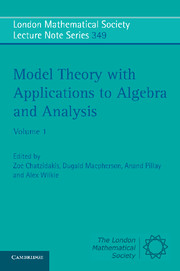Book contents
- Frontmatter
- Contents
- Preface
- Contributors
- Model theory and stability theory, with applications in differential algebra and algebraic geometry
- Differential algebra and generalizations of Grothendieck's conjecture on the arithmetic of linear differential equations
- Schanuel's conjecture for non-isoconstant elliptic curves over function fields
- An afterthought on the generalized Mordell-Lang conjecture
- On the definitions of difference Galois groups
- Differentially valued fields are not differentially closed
- Complex analytic geometry in a nonstandard setting
- Model theory and Kähler geometry
- Some local definability theory for holomorphic functions
- Some observations about the real and imaginary parts of complex Pfaffian functions
- Fusion of structures of finite Morley rank
- Establishing the o-minimality for expansions of the real field
- On the tomography theorem by P. Schapira
- A class of quantum Zariski geometries
- Model theory guidance in number theory?
Differentially valued fields are not differentially closed
Published online by Cambridge University Press: 04 August 2010
- Frontmatter
- Contents
- Preface
- Contributors
- Model theory and stability theory, with applications in differential algebra and algebraic geometry
- Differential algebra and generalizations of Grothendieck's conjecture on the arithmetic of linear differential equations
- Schanuel's conjecture for non-isoconstant elliptic curves over function fields
- An afterthought on the generalized Mordell-Lang conjecture
- On the definitions of difference Galois groups
- Differentially valued fields are not differentially closed
- Complex analytic geometry in a nonstandard setting
- Model theory and Kähler geometry
- Some local definability theory for holomorphic functions
- Some observations about the real and imaginary parts of complex Pfaffian functions
- Fusion of structures of finite Morley rank
- Establishing the o-minimality for expansions of the real field
- On the tomography theorem by P. Schapira
- A class of quantum Zariski geometries
- Model theory guidance in number theory?
Summary
Summary
In answer to a question of M. Aschenbrenner and L. van den Dries, we show that no differentially closed field possesses a differential valuation.
Introduction
In connection with their work on H-fields [1], M. Aschenbrenner and L. van den Dries asked whether a differentially closed field can admit a nontrivial (Rosenlicht) differential valuation.
If K is a field and v is a Krull valuation on K and L/K is an extensions field, then there is at least one extension of v to a valuation on L. It is known that the analogous statement for differential specializations on differential fields is false. Indeed, anomalous properties of specializations of differential rings were observed already by Ritt [11] and examples of nonextendible specializations are known (see Exercise 6(c) of Section 6 of Chapter IV of [7] and [4, 5, 9] for a fuller account).
In this short note, we answer their question negatively by exhibiting a class of equations which cannot be solved in any differentially valued field even though they have solutions in differentially closed fields. In a forthcoming work of Aschenbrenner, van den Dries and van der Hoeven [2], the main results of this note are explained via direct computations.
I thank M. Aschenbrenner and L. van den Dries for bringing this question to my attention and discussing the matter with me and the Isaac Newton Institute for providing a mathematically rich setting for those discussions.
- Type
- Chapter
- Information
- Model Theory with Applications to Algebra and Analysis , pp. 111 - 116Publisher: Cambridge University PressPrint publication year: 2008
- 1
- Cited by

